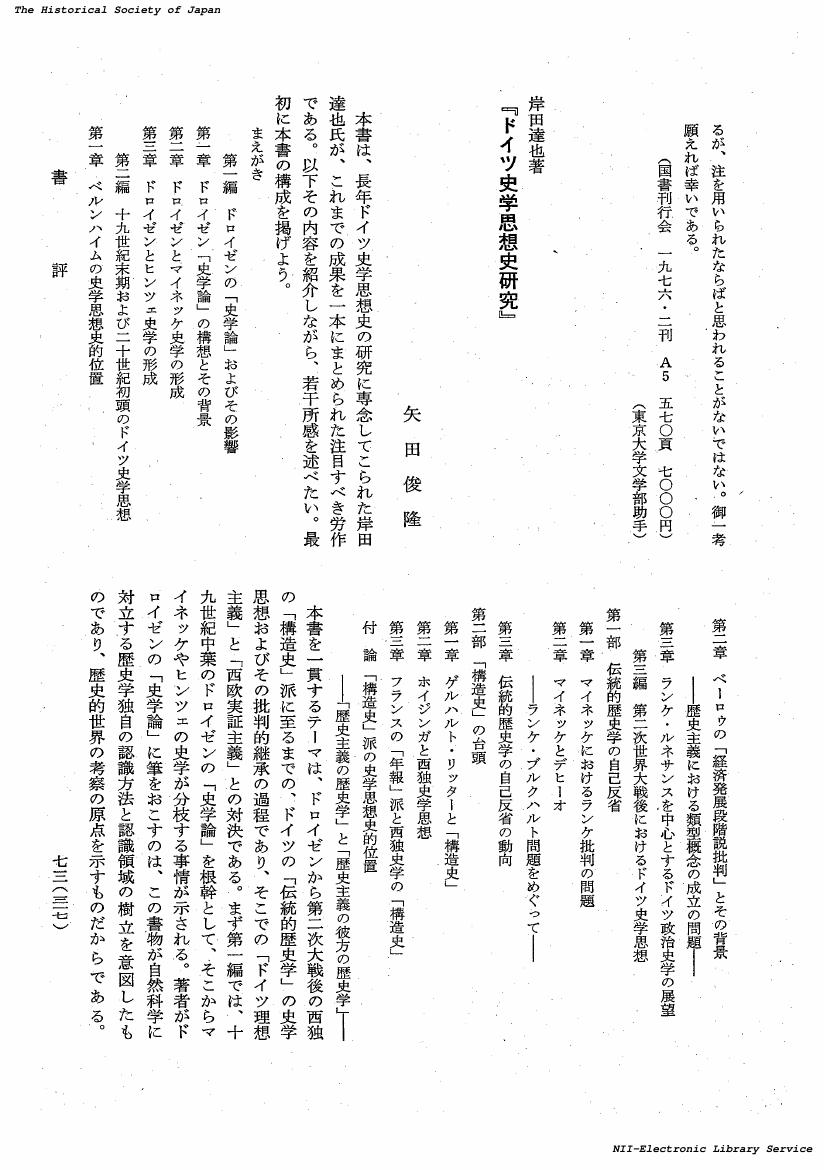27 0 0 0 OA ハプスブルク帝国の軍隊と民族問題 (20周年記念号)
- 著者
- 矢田 俊隆
- 出版者
- 北海道大学スラブ研究センター
- 雑誌
- スラヴ研究 (ISSN:05626579)
- 巻号頁・発行日
- vol.20, pp.49-67, 1975
5 0 0 0 OA オーストリア=ハンガリー二重帝国の構造と特質(一)-ハンガリーの立場を中心に-
- 著者
- 矢田 俊隆
- 出版者
- 北海道大学法学部
- 雑誌
- 北大法学論集 (ISSN:03855953)
- 巻号頁・発行日
- vol.25, no.2, pp.1-29, 1974-10-22
3 0 0 0 OA 1919年のオーストリア社会民主党とハンガリー・ソヴェト共和国の関係
- 著者
- 矢田 俊隆
- 出版者
- 北海道大学法学部
- 雑誌
- 北大法学論集 (ISSN:03855953)
- 巻号頁・発行日
- vol.27, no.3-4, pp.1-46, 1977-03-30
3 0 0 0 IR 西ヨーロッパにおけるハプスブルグ帝国史研究の近況
- 著者
- 矢田 俊隆
- 出版者
- 北海道大学スラブ研究センター
- 雑誌
- スラヴ研究 (ISSN:05626579)
- 巻号頁・発行日
- no.16, pp.251-270, 1972-03
2 0 0 0 OA 岸田達也著『ドイツ史学思想史研究』
- 著者
- 矢田 俊隆
- 出版者
- 公益財団法人 史学会
- 雑誌
- 史学雑誌 (ISSN:00182478)
- 巻号頁・発行日
- vol.86, no.3, pp.317-325, 1977-03-20 (Released:2017-10-05)
1 0 0 0 OA ドイツ三月革命と自由主義
- 著者
- 矢田 俊隆
- 出版者
- JAPANESE POLITICAL SCIENCE ASSOCIATION
- 雑誌
- 年報政治学 (ISSN:05494192)
- 巻号頁・発行日
- vol.15, pp.61-76,en4, 1964-12-21 (Released:2009-12-21)
The object of this article is to illustrate the particular process of dynamic development which the German liberalist movements showed during the Revolution 1848/49. It is as follows.The intellectual liberals sought to realize their pre-March mission of drawing government and people together as the real agents of their ideals, were progressively isolated from both of these powers and were subsequently themselves torn apart into their three generic divisions as they fell into dependence upon divergent real interests or remained impotently suspended about them. The dissolution of intellectual liberalism under the solvent of conscious self-interest in its agents meant the beginning of the end for the philosophical approach to politics, and introduced the general reorientation toward the frank and direct appreciation of interests and power which the Revolution had shown to be decisive in German society and politics. Such fundamental reorientation led to a political positivism, which meant the intellectual decline of German liberalism, because it undermined the comprehensive appeal of the liberal political ethic and, in consequence, diminished the force of assault upon the prevailing state-system in Germany.
1 0 0 0 OA プラハに開かれた最初のスラヴ民族会議がヨーロッパ諸民族にあてた声明 (訳及び解説)
- 著者
- 矢田 俊隆
- 出版者
- 北海道大学スラブ研究センター
- 雑誌
- スラヴ研究(Slavic Studies) (ISSN:05626579)
- 巻号頁・発行日
- vol.3, pp.93-100, 1959
1 0 0 0 OA フリードリッヒ大王の統治について
- 著者
- 矢田 俊隆
- 出版者
- 北海道大學法學會 = The Law Faculty of Hokkaido University
- 雑誌
- 北海道大學 法學會論集 (ISSN:04393244)
- 巻号頁・発行日
- vol.4, pp.112-140, 1954-02-20
